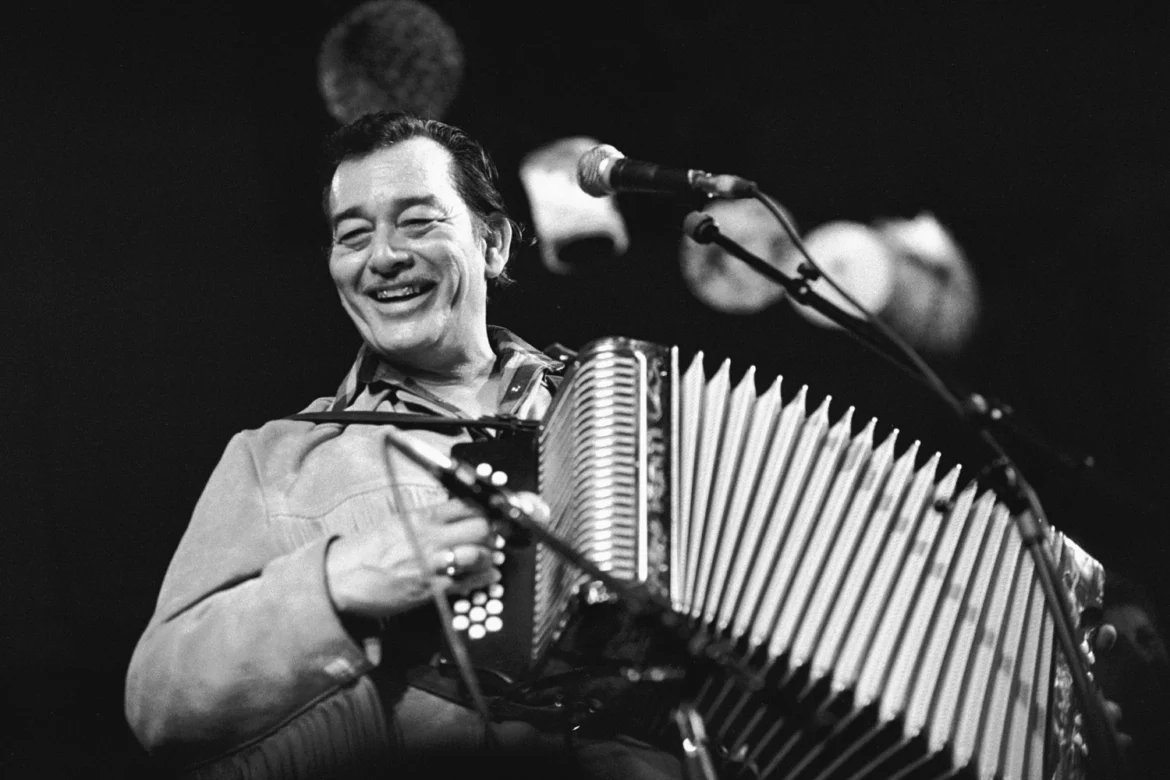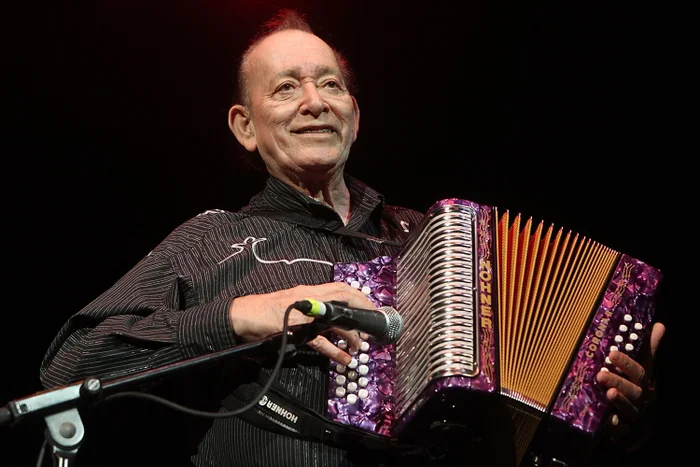
Flaco Jiménez: The Accordion King of Conjunto and Tex-Mex Music
Flaco Jiménez, born Leonardo Jiménez in San Antonio, Texas, on March 11, 1939, was a towering figure in American roots music, whose legacy spanned nearly eight decades. A Grammy-winning accordion virtuoso and genre-bending innovator, Jiménez was best known for his mastery of conjunto, norteño, and tejano music. As both a solo artist and a collaborative force, he redefined the cultural boundaries of American popular music by blending traditional Mexican folk sounds with rock, country, blues, and R\&B. His role in legendary bands like the Texas Tornados and Los Super Seven, as well as his extensive work as a session musician, made him one of the most celebrated and influential Latino musicians in American history.
A Musical Lineage: Early Life and Family
Flaco Jiménez’s music was more than a personal vocation—it was a family inheritance. Born into a prominent musical dynasty in San Antonio’s West Side barrio, Jiménez grew up steeped in the traditions of Tex-Mex music. His grandfather, Patricio Jiménez, was a respected accordionist, while his father, Santiago Jiménez Sr., was one of the pioneers of conjunto music—a style that fused traditional Mexican rancheras and corridos with German polkas and waltzes brought by Central European immigrants to Texas.
From a young age, Flaco absorbed the rhythms, melodies, and techniques of his forebears. He began playing the accordion by age 7, modeling his style after his father but soon outpacing the conventions of the time. He made his first public performance at age 9 and was recording by the time he was 15. Though rooted in tradition, Flaco Jiménez had a restlessly creative spirit that drove him to experiment with his sound.
Rise to Fame: Regional Popularity and National Recognition
In the 1950s and early 1960s, Jiménez gained recognition across Texas and the American Southwest for his high-energy accordion playing and smooth vocals. He became a regional star within the Mexican-American community, releasing a steady stream of singles and performing at dances, weddings, and radio shows. His sound was infectious—equal parts emotional resonance and rhythmic dynamism.
What set Jiménez apart from his contemporaries was his willingness to fuse conjunto with other American musical genres. While many purists focused solely on traditional forms, Flaco explored how accordion-based music could adapt to a changing musical landscape. He began incorporating country, blues, and rock elements into his performances, and soon caught the attention of musicians beyond the Latino music scene.
Breakthrough Collaborations: Bridging Genres
The 1970s marked a turning point in Jiménez’s career as he began collaborating with non-Latino artists, introducing conjunto to a much broader audience. One of his early high-profile collaborations was with Doug Sahm, the frontman of the Sir Douglas Quintet. Together, they fused Tex-Mex with psychedelic rock, blues, and R\&B, paving the way for a new genre hybrid.
.
.
Jiménez’s work with Ry Cooder further elevated his visibility. He appeared on Cooder’s 1976 album Chicken Skin Music, playing accordion on tracks like “He’ll Have to Go” and “Yellow Roses.” These recordings exposed Flaco’s talent to an entirely new demographic and showcased how the accordion, long considered a niche or regional instrument, could stand proudly alongside guitars, saxophones, and drums in mainstream music.
Perhaps most significantly, Jiménez played on the Rolling Stones’ 1978 track “Far Away Eyes,” cementing his reputation as a go-to session musician for boundary-pushing artists. He would go on to collaborate with Bob Dylan, Emmylou Harris, Willie Nelson, Dwight Yoakam, and many others.
The Texas Tornados: A Cultural Explosion
In the late 1980s, Flaco Jiménez joined forces with Doug Sahm, Augie Meyers, and Freddy Fender to form the Texas Tornados. This “supergroup” of Tex-Mex legends blended conjunto with rock, blues, country, and R\&B to create a vibrant, genre-defying sound. Their self-titled debut album in 1990 won a Grammy for Best Mexican-American Performance and became a commercial and critical success.
The Texas Tornados brought a sense of fun and cultural pride to their music. Songs like “(Hey Baby) Que Pasó?” and “Is Anybody Goin’ to San Antone” celebrated the Mexican-American experience with humor, warmth, and swagger. For Flaco, the Tornados represented both a return to his roots and a radical step forward in reimagining what Tex-Mex music could be.
Los Super Seven: A Pan-Latino Vision
In 1998, Jiménez was part of another supergroup: Los Super Seven, a collective that included members of Los Lobos, Raul Malo of The Mavericks, and other Latino music luminaries. Their self-titled debut album won a Grammy for Best Mexican-American Music Performance and blended traditional Mexican music with Cuban, Puerto Rican, and American influences.
Los Super Seven was a more experimental and pan-Latin project than the Texas Tornados. For Jiménez, it was an opportunity to collaborate with younger generations and artists from diverse Latin backgrounds, expanding the scope of his influence even further.
Solo Career and Grammy Success
Despite his success in collaborative projects, Flaco Jiménez maintained a prolific solo career throughout his life. He released dozens of solo albums, many of which earned accolades for their authenticity and innovation. His 1996 album Flaco Jiménez, released on Arista Records, won a Grammy for Best Mexican-American/Tejano Music Performance and featured collaborations with Dwight Yoakam and Buck Owens.
In 2015, he received the Grammy Lifetime Achievement Award, solidifying his legacy as a musical pioneer. He was also awarded the National Heritage Fellowship from the National Endowment for the Arts in 2012—America’s highest honor in folk and traditional arts.
Flaco Jiménez was one of the few artists to win both genre-specific and general music awards, underscoring his crossover appeal and universal musicianship.
Style and Technique: The Soul of the Accordion
Flaco Jiménez’s accordion playing was instantly recognizable. His style combined lightning-fast fingerwork, melodic inventiveness, and rhythmic precision. But it was his feel—his ability to make the instrument sing, weep, laugh, and shout—that truly set him apart.
Whether he was playing a traditional polka or backing a country ballad, Flaco brought emotional depth to every performance. His mastery of the diatonic button accordion allowed him to play with unparalleled fluidity, adapting to the needs of the song without ever compromising his own musical identity.
Jiménez often referred to his accordion as an extension of himself. “I don’t play the accordion,” he once said, “I talk through it.”
.

.
Cultural Impact and Legacy
Flaco Jiménez’s impact extended far beyond his technical prowess. He was a cultural ambassador for Mexican-American music and identity at a time when such representation was scarce in mainstream media. He helped elevate conjunto and tejano music from local traditions to globally recognized genres.
His collaborations helped break down the barriers between “ethnic” and “mainstream” music. By performing with rock, country, and blues artists, he demonstrated that Latino music was not a niche or novelty—it was a central part of the American musical fabric.
Countless musicians, both within and outside the Latino community, cite Jiménez as a major influence. Artists like Los Lobos, Grupo Fantasma, and The Mavericks carry his spirit in their music. Even non-Latino performers like Bruce Springsteen and John Mellencamp have praised Jiménez for showing how traditional music can be both reverent and revolutionary.
Final Years and Passing
Though health concerns occasionally limited his touring in the 2010s and 2020s, Flaco Jiménez remained active in music until his passing. He continued to record, mentor younger musicians, and make surprise appearances at festivals and concerts across Texas and beyond.
On July 31, 2025, Flaco Jiménez passed away peacefully at the age of 86. His death marked the end of an era, but his music, influence, and spirit live on in the countless recordings and artists he inspired.
San Antonio, his lifelong home, held a week of celebrations in his honor. Musicians from across the world gathered to perform his songs, share stories, and pay tribute to the man who had redefined the accordion and championed the cultural richness of Latino music.
Conclusion: A Titan of Tex-Mex
Flaco Jiménez was more than a musician—he was a cultural force. Through his decades-long career, he proved that music has no borders. He introduced millions to the sounds of conjunto and Tex-Mex, reinvented what the accordion could mean in popular music, and paved the way for generations of Latino artists.
In the annals of American music history, few figures are as universally respected and beloved. With each note he played, Jiménez told a story of migration, resilience, celebration, and pride. His music was—and remains—a joyful testament to the enduring power of culture, tradition, and innovation.
Even in death, the sound of Flaco Jiménez’s accordion echoes through cantinas, dance halls, and concert stages from San Antonio to the far corners of the world. He may be gone, but the rhythm he set continues.
Check out Flaco Jiménez on Amazon by clicking here.
If you found this interesting please share it with your friends and family, and check out some of our other articles on Musicians who Died in 2025.
.

